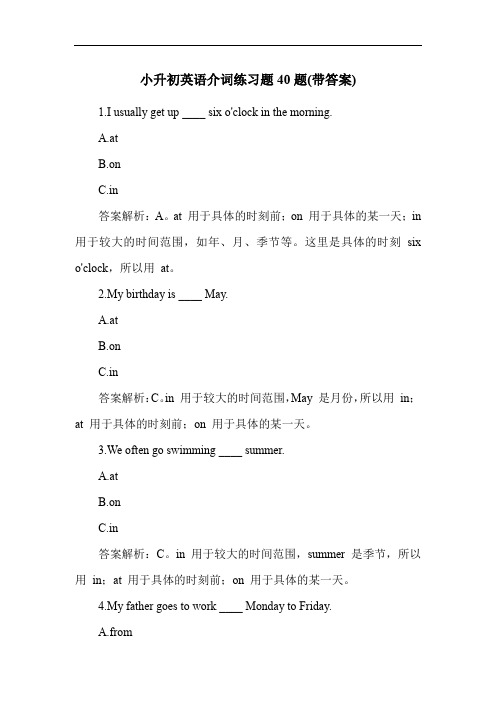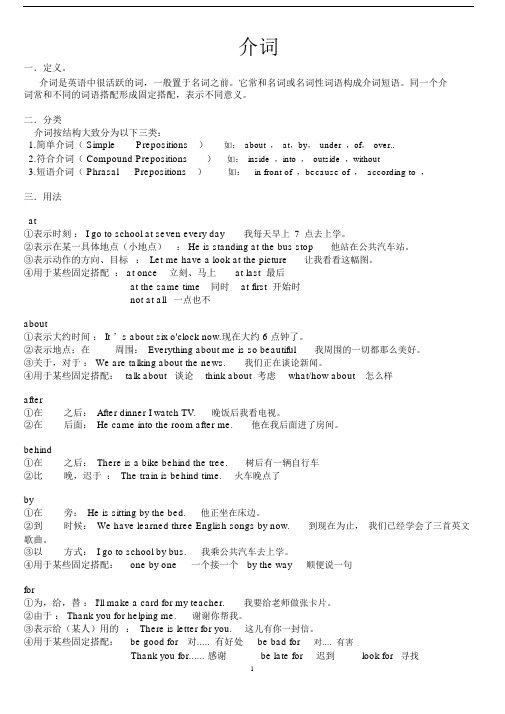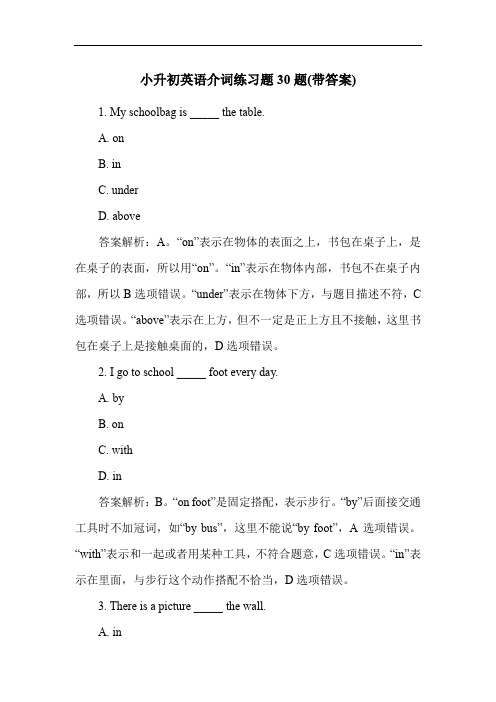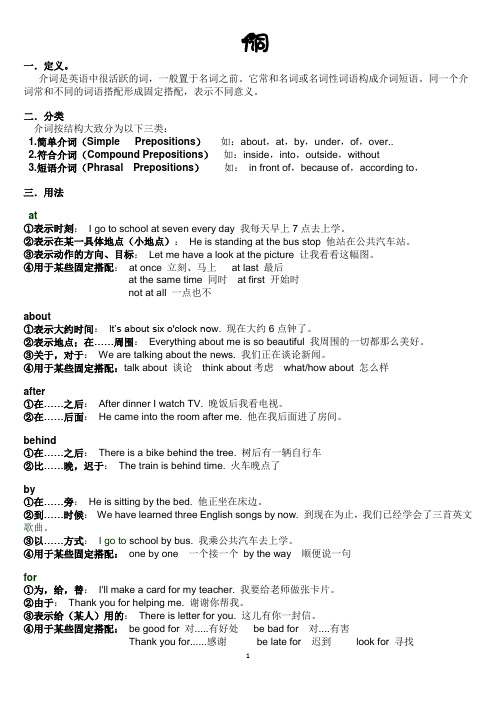(完整)关于小升初英语介词专项
小升初英语介词练习题40题(带答案)

小升初英语介词练习题40题(带答案)1.I usually get up ____ six o'clock in the morning.A.atB.onC.in答案解析:A。
at 用于具体的时刻前;on 用于具体的某一天;in 用于较大的时间范围,如年、月、季节等。
这里是具体的时刻six o'clock,所以用at。
2.My birthday is ____ May.A.atB.onC.in答案解析:C。
in 用于较大的时间范围,May 是月份,所以用in;at 用于具体的时刻前;on 用于具体的某一天。
3.We often go swimming ____ summer.A.atB.onC.in答案解析:C。
in 用于较大的时间范围,summer 是季节,所以用in;at 用于具体的时刻前;on 用于具体的某一天。
4.My father goes to work ____ Monday to Friday.A.fromB.onC.in答案解析:A。
from...to...表示从……到……;on 用于具体的某一天;in 用于较大的时间范围。
这里表示从周一到周五,所以用from。
5.We have a party ____ Christmas Day.A.atB.onC.in答案解析:B。
on 用于具体的某一天,Christmas Day 是具体的一天,所以用on;at 用于具体的时刻前;in 用于较大的时间范围。
6.I finish my homework ____ the evening.A.atB.onC.in答案解析:C。
in 用于较大的时间范围,the evening 是晚上这个较大的时间范围,所以用in;at 用于具体的时刻前;on 用于具体的某一天。
7.My mother gets home ____ five o'clock in the afternoon.A.atB.onC.in答案解析:A。
(完整版)小升初英语介词专项练习

(完整版)小升初英语介词专项练习介词基础知识介词是连接名词、代词或动词与其他词或短语的一类虚词。
在英语中,介词的用法非常重要,所以我们需要加强对介词的理解和掌握。
下面是一些小升初英语介词专项练题,帮助你巩固基础知识。
介词是连接名词、代词或动词与其他词或短语的一类虚词。
在英语中,介词的用法非常重要,所以我们需要加强对介词的理解和掌握。
下面是一些小升初英语介词专项练题,帮助你巩固基础知识。
介词是连接名词、代词或动词与其他词或短语的一类虚词。
在英语中,介词的用法非常重要,所以我们需要加强对介词的理解和掌握。
下面是一些小升初英语介词专项练题,帮助你巩固基础知识。
介词是连接名词、代词或动词与其他词或短语的一类虚词。
在英语中,介词的用法非常重要,所以我们需要加强对介词的理解和掌握。
下面是一些小升初英语介词专项练题,帮助你巩固基础知识。
练题1.请填入合适的介词。
- I'm looking forward ___________ ___ party.- We walked _________ ___.2.根据句意选择合适的介词:- I usually go to school ________ foot.- The dog is hiding ________ the table.3.请将下列句子中的错误部分改正:- My sister is good ___。
She always wins __ in __ her team.4.根据图片选择合适的介词填空:- The cat is ____________ the box.- The bird is ___________ the tree.5.根据句意从方框中选择合适的介词填空(方框中有多余选项):- There is a beautiful garden ________ the house.- The book is ________ the shelf.方框选项:on。
(完整word版)小升初英语介词专项.doc

介词一.定义。
介词是英语中很活跃的词,一般置于名词之前。
它常和名词或名词性词语构成介词短语。
同一个介词常和不同的词语搭配形成固定搭配,表示不同意义。
二.分类介词按结构大致分为以下三类:1.简单介词( Simple Prepositions)如:about,at,by,under,of,over..2.符合介词( Compound Prepositions)如:inside,into,outside,without3.短语介词( Phrasal Prepositions)如:in front of,because of,according to,三.用法at①表示时刻: I go to school at seven every day我每天早上7点去上学。
②表示在某一具体地点(小地点): He is standing at the bus stop他站在公共汽车站。
③表示动作的方向、目标:Let me have a look at the picture让我看看这幅图。
④用于某些固定搭配: at once立刻、马上at last 最后at the same time同时at first 开始时not at all一点也不about①表示大约时间: It ’s about six o'clock now.现在大约 6 点钟了。
②表示地点;在周围:Everything about me is so beautiful我周围的一切都那么美好。
③关于,对于: We are talking about the news.我们正在谈论新闻。
④用于某些固定搭配:talk about谈论think about 考虑what/how about怎么样after①在之后:After dinner I watch TV.晚饭后我看电视。
②在后面:He came into the room after me.他在我后面进了房间。
小升初英语介词练习题30题(带答案)

小升初英语介词练习题30题(带答案)1. My schoolbag is _____ the table.A. onB. inC. underD. above答案解析:A。
“on”表示在物体的表面之上,书包在桌子上,是在桌子的表面,所以用“on”。
“in”表示在物体内部,书包不在桌子内部,所以B选项错误。
“under”表示在物体下方,与题目描述不符,C 选项错误。
“above”表示在上方,但不一定是正上方且不接触,这里书包在桌子上是接触桌面的,D选项错误。
2. I go to school _____ foot every day.A. byB. onC. withD. in答案解析:B。
“on foot”是固定搭配,表示步行。
“by”后面接交通工具时不加冠词,如“by bus”,这里不能说“by foot”,A选项错误。
“with”表示和一起或者用某种工具,不符合题意,C选项错误。
“in”表示在里面,与步行这个动作搭配不恰当,D选项错误。
3. There is a picture _____ the wall.A. inB. onC. atD. to答案解析:B。
“on the wall”表示在墙的表面上有一幅画。
“in the wall”表示在墙里面,通常指嵌入墙里的东西,比如窗户在墙里可以用“in the wall”,这里画是在墙表面,A选项错误。
“at”表示在某个点,不能表示画和墙的关系,C选项错误。
“to”表示方向等,不适合描述画和墙的关系,D选项错误。
4. We have English class _____ Monday.A. inB. onC. atD. for答案解析:B。
在星期几前面用“on”,这是固定用法。
“in”通常用于表示在较长的时间段内,如“in a month”。
“at”用于表示具体的时刻,如“at 3 o'clock”。
“for”表示持续的一段时间,用于完成时等,这里说在周一,要用“on”。
小升初英语介词练习题40题含答案解析

小升初英语介词练习题40题含答案解析1.I usually go to school ____ seven o'clock.A.atB.inC.on答案解析:A。
at 用于具体的时刻前,seven o'clock 是具体时刻,所以用at。
in 用于较长的时间段,如in the morning/afternoon/evening。
on 用于具体的某一天或特定的日期,如on Monday/on June 1st。
2.My birthday is ____ May.A.atB.inC.on答案解析:B。
in 用于较长的时间段,月份属于较长的时间段,所以用in。
at 用于具体的时刻前。
on 用于具体的某一天或特定的日期。
3.We have a picnic ____ Sunday.A.atB.inC.on答案解析:C。
on 用于具体的某一天,Sunday 是具体的某一天,所以用on。
at 用于具体的时刻前。
in 用于较长的时间段。
4.My father goes to work ____ the morning.B.inC.on答案解析:B。
in the morning/afternoon/evening 是固定搭配,表示在上午/下午/晚上,用in。
at 用于具体的时刻前。
on 用于具体的某一天或特定的日期。
5.The party is ____ the evening of June 1st.A.atB.inC.on答案解析:C。
on 用于具体的某一天或特定的日期的晚上,the evening of June 1st 是具体的日期的晚上,所以用on。
at 用于具体的时刻前。
in 用于较长的时间段。
6.I get up ____ six thirty ____ the morning.A.at,inB.in,inC.on,in答案解析:A。
at 用于具体的时刻前,six thirty 是具体时刻,所以用at。
(完整)小升初英语介词专项.doc

介词一.定。
介是英中很活的,一般置于名之前。
它常和名或名性构成介短。
同一个介常和不同的搭配形成固定搭配,表示不同意。
二.分介按构大致分以下三:1.介( Simple Prepositions)如:about,at,by,under,of,over..2.符合介( Compound Prepositions)如:inside,into,outside,without3.短介( Phrasal Prepositions)如:in front of,because of,according to,三.用法at①表示刻: I go to school at seven every day我每天早上7点去上学。
②表示在某一具体地点(小地点): He is standing at the bus stop他站在公共汽站。
③表示作的方向、目:Let me have a look at the picture我看看幅。
④用于某些固定搭配: at once立刻、上at last 最后at the same time同at first 开始not at all一点也不about①表示大: It ’s about six o'clock now.在大6点了。
②表示地点;在⋯⋯周: Everything about me is so beautiful我周的一切都那么美好。
③关于,于: We are talking about the news.我正在新。
④用于某些固定搭配:talk about think about 考what/how about怎么after①在⋯⋯之后: After dinner I watch TV.晚后我看。
②在⋯⋯后面: He came into the room after me.他在我后面了房。
behind①在⋯⋯之后: There is a bike behind the tree.后有一自行②比⋯⋯晚,于: The train is behind time.火晚点了by①在⋯⋯旁: He is sitting by the bed.他正坐在床。
小升初英语语法介词

14.before :在...之前 15.in the middle在....中间 17.after 在....后面 18.with和....一起 play with y friends 19.up:向上 up the hill 20.down:向下 down the hill 21.about:大约 about 20 hours
A.by
B.for C.under
( B )5.What are you going to do Sunday?
A.at B.on C.in
( A )6.--How do you go to school? -- bus.
A.by B.for C.at
( C )7.My father goes to work eight o'clock every morning.
21.of: ....的 He is 22.by:乘坐....交通工具 by bus 23.like: 像.... It looks like rain. 24.between :在...之间
( B )1.--Where are you, Tom? --- I'm your right.
A.at
小升初专题复习 介词
介词是表示名词、代词等与句中其他词的关 系,在句中不能单独作句子成分。
in, on, under, at, in the front of, over, behind, beside, next to, near, for, from,to, before, in the middle,after, with,up,down,about, of, by,like, between
(完整版)小升初英语介词专项

介词一.定义。
介词是英语中很活跃的词,一般置于名词之前。
它常和名词或名词性词语构成介词短语。
同一个介词常和不同的词语搭配形成固定搭配,表示不同意义。
二.分类介词按结构大致分为以下三类:1.简单介词(Simple Prepositions)如:about,at,by,under,of,over..2.符合介词(Compound Prepositions)如:inside,into,outside,without3.短语介词(Phrasal Prepositions)如:in front of,because of,according to,三.用法at①表示时刻:I go to school at seven every day 我每天早上7点去上学。
②表示在某一具体地点(小地点):He is standing at the bus stop 他站在公共汽车站。
③表示动作的方向、目标:Let me have a look at the picture 让我看看这幅图。
④用于某些固定搭配:at once 立刻、马上at last 最后at the same time 同时at first 开始时not at all 一点也不about①表示大约时间:It’s about six o'clock now. 现在大约6点钟了。
②表示地点;在……周围:Everything about me is so beautiful 我周围的一切都那么美好。
③关于,对于:We are talking about the news. 我们正在谈论新闻。
④用于某些固定搭配:talk about 谈论think about考虑what/how about 怎么样after①在……之后:After dinner I watch TV. 晚饭后我看电视。
②在……后面:He came into the room after me. 他在我后面进了房间。
- 1、下载文档前请自行甄别文档内容的完整性,平台不提供额外的编辑、内容补充、找答案等附加服务。
- 2、"仅部分预览"的文档,不可在线预览部分如存在完整性等问题,可反馈申请退款(可完整预览的文档不适用该条件!)。
- 3、如文档侵犯您的权益,请联系客服反馈,我们会尽快为您处理(人工客服工作时间:9:00-18:30)。
介词一.定义。
介词是英语中很活跃的词,一般置于名词之前。
它常和名词或名词性词语构成介词短语。
同一个介词常和不同的词语搭配形成固定搭配,表示不同意义。
二.分类介词按结构大致分为以下三类:1.简单介词(Simple Prepositions)如:about,at,by,under,of,over..2.符合介词(Compound Prepositions)如:inside,into,outside,without3.短语介词(Phrasal Prepositions)如:in front of,because of,according to,三.用法at①表示时刻:I go to school at seven every day 我每天早上7点去上学。
②表示在某一具体地点(小地点):He is standing at the bus stop 他站在公共汽车站。
③表示动作的方向、目标:Let me have a look at the picture 让我看看这幅图。
④用于某些固定搭配:at once 立刻、马上at last 最后at the same time 同时at first 开始时not at all 一点也不about①表示大约时间:It’s about six o'clock now. 现在大约6点钟了。
②表示地点;在……周围:Everything about me is so beautiful 我周围的一切都那么美好。
③关于,对于:We are talking about the news. 我们正在谈论新闻。
④用于某些固定搭配:talk about 谈论think about考虑what/how about 怎么样after①在……之后:After dinner I watch TV. 晚饭后我看电视。
②在……后面:He came into the room after me. 他在我后面进了房间。
behind①在……之后:There is a bike behind the tree. 树后有一辆自行车②比……晚,迟于:The train is behind time. 火车晚点了by①在……旁:He is sitting by the bed. 他正坐在床边。
②到……时候:We have learned three English songs by now. 到现在为止,我们已经学会了三首英文歌曲。
③以……方式:I go to school by bus. 我乘公共汽车去上学。
④用于某些固定搭配:one by one 一个接一个by the way 顺便说一句for①为,给,替:I'll make a card for my teacher. 我要给老师做张卡片。
②由于:Thank you for helping me. 谢谢你帮我。
③表示给(某人)用的:There is letter for you. 这儿有你一封信。
④用于某些固定搭配:be good for 对.....有好处be bad for 对....有害Thank you for......感谢be late for 迟到look for 寻找in①在……里面:The pencil is in the desk. 铅笔在课桌里。
②在一段时间里:We have four classes in the morning. 我们上午有四节课。
③用,以:What's this in English? 这用英语怎么说?④在某一年份,季节,月份:in 2002, in spring, in January⑤表示状态,服饰:Helen is in yellow. 海伦身穿黄色衣服。
⑥在……方面:He is weak in English. 他的英语不行。
⑦用于某些固定搭配:in front of 在……前面in the end 最后in time 及时in bed 卧床in the sun 阳光下in class 课上in English用英语like①像……样:He looks like his father. 他像他的父亲。
②这样,那样:Don't look at me like that. 别那样看着我。
③怎样:What's the weather like? 天气怎样。
④用于某些固定搭配:look like 看起来像sound like听起来像near靠近,在……附近:My bed is near the window. 我的床在窗户旁。
of①的(表示所属关系):This is a photo of my family. 这是一张我家的照片。
②……的(用于所有格):He is a friend of mine. 他是我的一个朋友。
③表示数量(与连词连用):One of us is from Beijing. 我们中有一个来自北京④想到,谈到:I often think of them. 我常常想到他们。
⑤用于某些固定搭配:of course 当然because of 因为,由于on①在……上面:There are some apple on the tree. 树上有些苹果。
②在(星期)天,在某天的上午(下午,晚上):They go to English class on Sunday. 星期天他们去上英语课。
I left Beijing on the morning of May 1. 我在5月1日早上离开北京。
③用于某些固定搭配:on duty 值日on time 准时over①在……正上方:There is a lamp over the table. 桌子上方有一盏灯。
②遍及,穿过:There is a bridge over the river. 有座桥横跨那条河。
③超过,不止:She is a little over 2. 她两岁多了。
to①到,往,向:He walks to the window. 他走向窗户。
②表示时间、数量,到……为止Please count from ten to thirty. 请从10数到30.③向,对,给:Happy New Year to you all. 大家新年好。
④用于某些固定搭配:from....to....从.....到..... too....to....太.....不能.....underWhat's under your desk? 你书桌底下是什么?with①和:Could you go home with me? 你能和我一起回家吗?②表示伴随状态,带有:Who's that girl with glasses? 那位戴眼睛的女孩是谁?三、介词的固定搭配1)介词和名词的连用2)动词和介词的连用3)形容词和介词连用atarrive at/in 到达=get to=reachat first 起初;开始at dinner 在吃晚饭at last 最后at night 在深夜at school 在上学at home 在家;无拘束laugh at 嘲笑at present 现在at work 上班,在工作look at 看....be good at 擅长..... at once立刻onget off/on 上/下车on one’s way home 在我回家路上on duty 值日turn on/off 打开/关掉on holiday 度假on time 准时on the left/right 在左/右边on the radio 在广播中on foot 步行on sale 出售;降价出售put on 穿上on the farm 在农场on TV 在电视上播放on the phone 在电话中inbe interested in 对……感兴趣in class 在课堂上in English 用英语in bed 卧床in hospital 住院in the middle 在中间in the day 在白天do well in 擅长in the sun 在阳光下forwait for 等待be late for 在look for 寻找Thank you for 感谢be good/bad for 对.....有益/有害what’s for lunch? 午饭吃什么?withhelp sb. with sth. 帮助某人...... be busy with 忙于......see with our eyes 用眼睛看write with a pen 用钢笔写be strict with 对.....要求严格talk with 和....谈论4)其他look like 看起来象...... hear from 收到....来信learn from 向.....学习turn up/down 调大/小音量listen to 听...... get up 起床too.....to....太....不能....实战演练一.选择填空,并把其字母编号写在括号内。
( ) 1. It’s time ______ supper.A. atB. inC. onD. for( ) 2. It’s no time ______ school. It’s time ______ go back home.A. to, forB. to, toC. for, to( ) 3. Mr Brown comes ______ America.A. atB. fromC. inD. to( ) 4. What’s this _____ English?A. inB. atC. onD. under( ) 5. Sometimes I go to school _____ foot.A. byB. inC. onD. with( ) 6. Count (数)_____ one _____ ten.A. from, byB. from, toC. to, toD. at, to( ) 7.My sister is looking ____ her new shoes now.A. atB. afterC. forD. to( ) 8. It’s cold outside. Please _____ your warm clothes.A. put inB. take offC. put onD. put up( ) 9. The classroom is quite different _____ that one.A. ofB. fromC. withD. like( ) 10. A: Do many children in our class often skate ________ winter?B: Yes, they usually have fun _______ winter.A. in, inB. on, onC. at, at( ) 11. A: Does the autumn start _________ August?B; Sometimes it does. But usually it starts _______ September.A. in, inB. on, onC. at, at( ) 12. I usually play table tennis ________ school.A. afterB. whenC. by( )13. I like summer. Is it cool ______ autumn? What _______ summer? Oh, it is too hot.A. in, about onB. on, about onC. in, about in( ) 14. A: Do you listen to the radio _______ a long time?B: No, I often listen to it ______________ twenty minutes.A. for, toB. for, forC. to, for( ) 15. When is May Day? It’s _______ the first of May.A. onB. inC. at( ) 16. They will move to the new school ______ next Monday.A. onB. inC. /( ) 17. He always goes to school at 7:00 ______ every day.A. onB. inC. /( ) 18. She does her homework ______ half an hour every day.A. inB. forC. /二、用所给的介词填空。
